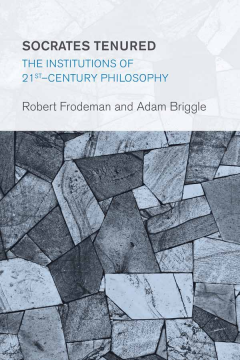
Additional Information
Book Details
Abstract
Professional philosophy has strayed so far from its roots that Socrates wouldn’t stand a chance of landing tenure in most departments today. After all, he spent his time talking with people from all walks of life rather than being buried in the secondary literature and polishing arguments for peer-reviewed journals. Yet somehow this hypertrophy styles itself ‘real’ philosophy.
Socrates Tenured diagnoses the pathologies of contemporary philosophy and shows how the field can be revitalized. The first part of the book sketches the crisis facing philosophy in a neoliberal age and traces its roots back to the 20th-century move to turn philosophy into an academic discipline. In the second part the authors look at various attempts from applied ethics to their own brand of ‘field philosophy’ to confront the resulting problems of insularity and societal irrelevance. Part three connects this evaluation of philosophy with wider discussions in the politics of knowledge about the impacts of research on society. The final chapters consider both what impacts philosophy might have and what a philosophy of impact might look like.
Socrates Tenured argues that academic philosophy has abandoned its roots and lost its way—it is sterile, insular, and largely unengaged with issues that the public cares about. Frodeman and Briggle (both, Univ. of North Texas) are less worried about whether this is defensible than they are about the likely practical upshot of this turn of events. They believe philosophy as currently practiced is unsustainable because the cost cannot be justified to state legislators and administrators at private schools; funds are bound to be cut for philosophy programs and shifted to areas thought to be more relevant, such as STEM programs. But the authors believe the situation is not hopeless. Philosophers can revive their discipline by addressing issues that society cares about and writing about those issues in language that nonspecialists can understand, though that language may be less rigorous than is currently required by professional standards. This process requires philosophers to engage in what the authors call "field philosophy"—to become more interdisciplinary and inter-institutional (by working with state legislatures, hospitals, and local governments, for example). Summing Up: Recommended. Graduate students, researchers, faculty.
Bob Frodeman and Adam Briggle pose a fundamental problem in Socrates Tenured, wondering whether "academic philosophers are ready to help society think.” For the sake of the discipline, to be sure, but more importantly for the sake of society, I hope readers take up the challenges posed in this important book.
Michael S. Roth, President, Wesleyan University
[A] lively and provocative new book … Socrates Tenured offers a bold diagnosis of philosophy’s malaise and a proposed means to escape it: whatever your view of the proposals, they are worth exploring and debating
We have not had such a reflective and thorough study of the institutional setting for philosophy affects since John Dewey’s Reconstruction in Philosophy. Frodeman and Briggle show that academe shapes how philosophy is received as much as how it is practiced.
Paul Thompson, W. K. Kellogg Chair in Agricultural, Food and Community Ethics, Michigan State University
Robert Frodeman is Professor of Philosophy and founding Director of the Center for the Study of Interdisciplinarity at the University of North Texas. His publications include Sustainable Knowledge: A Theory of Interdisciplinarity (2014) and The Oxford Handbook of Interdisciplinarity (editor in chief; 2nd edition 2016).
Adam Briggle is Associate Professor of Philosophy and Religion at the University of North Texas. He is the author of A Rich Bioethics (2010), co-author of Ethics and Science: An Introduction (2012), and author of A Field Philosopher’s Guide to Fracking (2015).
Table of Contents
| Section Title | Page | Action | Price |
|---|---|---|---|
| _GoBack | ii | ||
| _GoBack | 27 | ||
| _GoBack | 47 | ||
| _GoBack | 55 | ||
| _GoBack | 109 | ||
| _GoBack | 151 | ||
| OLE_LINK15 | 156 | ||
| OLE_LINK16 | 156 | ||
| _GoBack | 167 |
